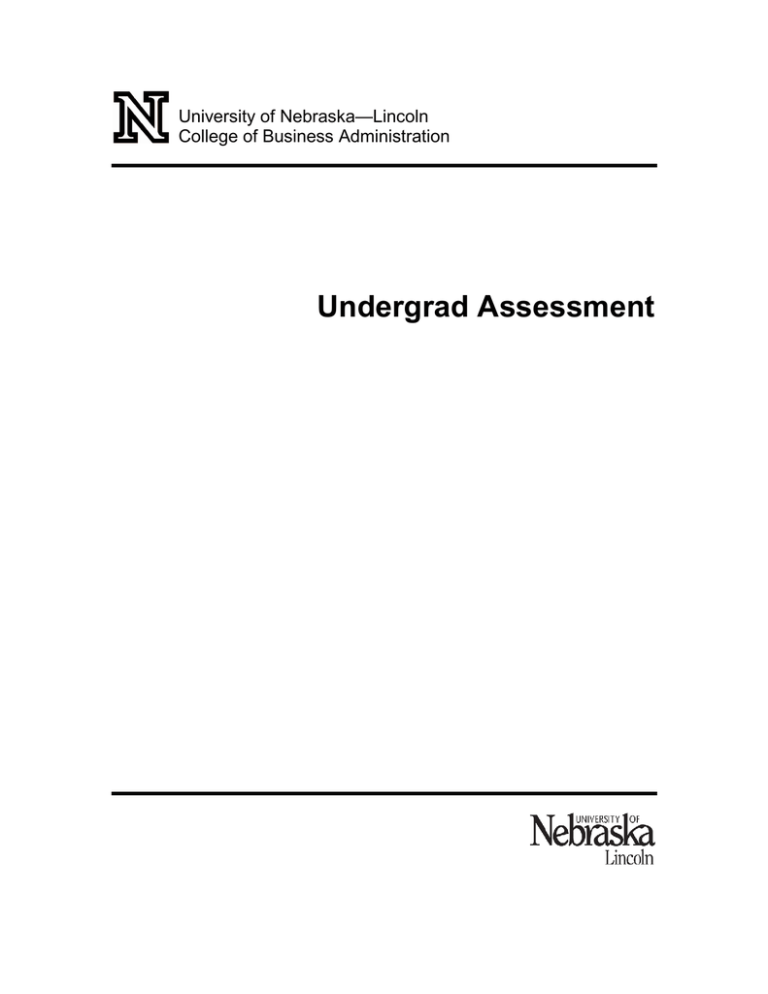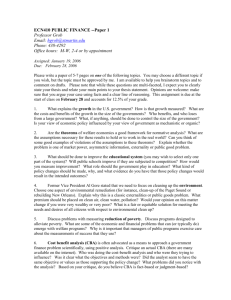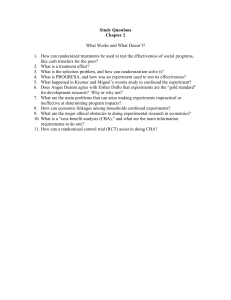Undergrad Assessment —Lincoln University of Nebraska
advertisement

University of Nebraska—Lincoln College of Business Administration Undergrad Assessment CBA Undergraduate Goals and Outcomes Assessment Strategy The College of Business Administration’s strategy is to continue development of the procedures implemented during past academic years in order to obtain long-term, comparison data. College Objectives and Assessment Procedures for Each Objective The undergraduate program of the College of Business Administration has the following objectives and intended outcomes: 1. Communication skills Graduates will be prepared and able to communicate effectively, in writing and in presentations, for a career in business. Criteria for Success of this Outcome: 1a. 75% of seniors will successfully (as judged by the faculty) complete and present a course project in the capstone course (MNGT 475 or department equivalent). 1b. 75% of students will indicate on the senior survey that they agree or strongly agree that their academic experience and student activities developed their skills and knowledge in writing, public speaking, and discussing ideas and issues. 1c. 75% of writing and presentation samples evaluated by the writing lab will be judged acceptable. 1d. 75% of employers will agree or strongly agree with the statement: Our company is satisfied with the level of writing and presentation skills of CBA graduates. 2. Intellectual depth and breadth Graduates will demonstrate depth and breadth of knowledge necessary to obtain a career in business. Criteria for Success of this Outcome: 2a. 60% of the students taking the ETS Major Field Test will score above the national average for the overall composite score. 2b. The median score for students in each major will be above the national median score for the ETS Field Test in Business. 2c. 60% of employers will rate the quality of education provided to CBA students as above average to excellent. 2d. 75% of students will indicate on the senior survey they agree or strongly agree that they are satisfied with their CBA academic experience and that their CBA education prepared them for a career. 2e. 60% of employers will agree or strongly agree that CBA graduates are well prepared to advance in their organization. 3. Critical thinking Graduates will possess critical thinking (analytical, quantitative, and problem solving) skills and will be able to apply the intellectual depth and breadth with which they have been provided. Criteria for Success of this Outcome: 3a. 75% of graduates will successfully demonstrate (as judged by the faculty) in a major course project in the capstone course MNGT 475 and/or their major departmental capstone course, the ability to structure, synthesize, and sort relevant information and apply their knowledge to new problem settings. 3b. 65% of employers will agree or strongly agree with the statement: Our company is satisfied with CBA graduates’ problem solving abilities and their ability to analyze/discuss ideas and issues. 3c. The mean percentage correct on the Quantitative Business and Information section of the ETS Major Field Test will rank at the 60th percentile (or above) nationally. 3d. 75% of our graduates will agree or strongly agree on the Senior Survey and on the Alumni Survey that their academic experiences and student activities at CBA developed skills and knowledge in analyzing ideas and issues, discussing ideas and issues and in problem solving. 4. Business environment knowledge/skills Graduates will have knowledge and awareness of ethics, technology, diversity, business environment (domestic and international) factors, leadership and team skills, and change management so that they are well prepared for a career in business. Criteria for Success of this Outcome: 4a. An evaluation of the syllabi of the core CBA courses (Modules 3 and 4) will demonstrate significant student exposure to these topics. 4b. The mean percentages correct on the International Issues and the Legal and Social Environment sections of the ETS Major Field Test will rank at the 60th percentile (or above) nationally. 4c. 75% of our seniors, alumni, employers and our faculty will agree or strongly agree (on survey instruments) that CBA developed skills and knowledge in using new technologies, recognizing ethical issues, and understanding international perspectives. 4d. 75% of our seniors, alumni, employers and our faculty will agree or strongly agree (on survey instruments) that the CBA experience developed leadership and teamwork skills and knowledge. 4e. 75% of our seniors, alumni, employers and our faculty will agree or strongly agree (on survey instruments) that the CBA experience developed their ability to manage change. 4f. In the process of evaluating the Defining Issues Test (DIT) as a metric for assessing ethics. 4g. 75% of seniors will agree or strongly agree in the senior survey that academic experiences and student activities at CBA developed skills and knowledge in recognizing ethical issues. 5. Overall preparation College of Business graduates will find ready employment in their field or be well prepared for admission into graduate programs. Criteria for success of this outcome: 5a. 75% of our seniors, alumni, employers and our faculty will agree or strongly agree (on survey instruments) that CBA provides good preparation for a career or further education. 5b. 70% of employers will rank UNL CBA graduates the same or better than students they have hired from other universities. 5c. 50% of employers will rate the success of past CBA hires as above average. 5d. 50% of graduating students will indicate on the future plans survey that they have secured a full-time job to begin after graduation or are pursuing a graduate program. 5e. The placement rate of graduating seniors reported to UNL Career Services will be at least 60% overall and 50% for each major. Placement rate is calculated as the number of students seeking employment who obtained a job divided by the number of students seeking employment. Outcomes Assessment Matrix for Core Undergraduate Classes Undergraduate Learning Goals and Corresponding Outcomes Critical Thinking and Application of Knowledge An ability to apply critical thinking skills to new and different problem settings A knowledge of values, ethics, and other contemporary issues The knowledge necessary to understand business in a global and societal context 2 3 3 3 3 1 1 Acct 202 3 3 3 3 3 2 1 3 2 3 3 3 2 An ability to communicate information in a presentational fashion Acct 201 Core Classes An ability to communicate information in writing An ability to solve analytical and quantitative problems Business Environment Knowledge and Skills An ability to demonstrate a possession of knowledge pertaining to core classes Intellectual Depth and Breadth An ability to demonstrate a possession of knowledge inside of one’s major Communication Skills BLaw 371 Econ 211 1 2 2 2 2 1 1 Econ 212 1 2 2 2 2 1 1 Econ 215 3 3 3 2 1 Fin 361 2 2 3 3 1 3 3 3 2 2 2 2 2 2 2 3 3 1 1 2 3 3 2 3 2 2 3 3 2 3 2 3 Mngt 331 2 Mngt 350 2 Mngt 360 1 Mngt 475 2 Mkt 341 3 2 2 Acct 201 - Introductory Accounting I BLaw 371 - Legal Environment Econ 212 - Principles of Microeconomics Fin 361 – Finance Mngt 350 - Introduction to MIS Mngt 475 - Business Policies 1 2 Acct 202 - Introductory Accounting II Econ 211 - Principles of Macroeconomics Econ 215 - Statistics Mngt 331 - Operations &Resource Mngt Mngt 360 - Mngt Behavior Organizations Mkt 341 - Marketing Numbers in this table correspond to the following taxonomy: 1=Knowledge—Knowledge of an outcome concept dictates the ability to observe and recall information and to understand major ideas. 2=Application—Application of an outcome concept dictates the ability to use information, methods, or theories in new situations and the ability to solve problems using required skills or knowledge. 3=Evaluation—Evaluation of an outcome concept dictates the ability to compare and discriminate between ideas, verify the value of evidence, and to make choices based on reasoned arguments.


